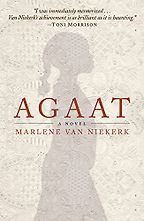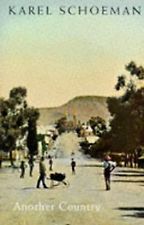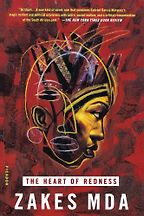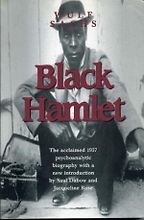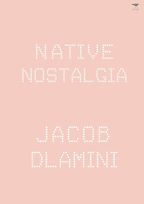In thinking about identity in South Africa, you’ve chosen books that are very different from the more journalistic books about the country that you write yourself. The first book you’ve chosen is a novel about African women.
It’s about an old white woman and her young black maid, Agaat – about their relationship and what happens between them. That’s the basic story but there are extraordinary things happening allegorically. If you look at the cultural artefacts that these women are fighting over, are communicating over, they are bastion symbols of Afrikanerdom – farming, because the white women farm, and tapestry and sewing, which was the domain of the Afrikaner white woman. These are the things that Agaat has taken over. There’s something very subtle and complicated going on at an allegorical level. What’s happening is that these white artefacts are being lost, are being taken over by black people. That’s the one side of the story, losing these things to a black person. But the other side of the story is that to be free and to be black is to be stuck with white artefacts, using them against white people. There is a very murky and quite cynical idea of what freedom means in South Africa today.
This theme of identity being lost or confused is also there to some extent in your next choice.
Well, the Karel Schoeman is a much older novel. It was written in the early 1980s in Afrikaans and it’s a historical novel, set in the 1870s before South Africa existed, in the [Orange] Free State. The central character is a Dutchman, a very refined, learned, late middle aged, bourgeois Dutchman, who comes to South Africa for the air because he has TB. The novel is the process of his dying, and his bewilderment at this very strange African wilderness and strange white society he finds himself in while he dies. And again there is a very subtle allegory going on, which is really about whether it is possible to be white and to live and die in Africa. All the observations about this strange colonial outpost are of things that are out of joint.
What kind of thing?
Well, the priest gives a sermon in Dutch which would embarrass a Dutchman. These white people are losing their language. There’s an orchestral ensemble in the evening and it’s very crude music that would be an embarrassment in the slums of Europe. So, he’s wondering what it means to be white in Africa, whether one shrivels up and loses ones culture and dies or whether something can flourish. By the end of the novel, by the time he’s almost dead, he has developed some kind of relationship with the landscape, which is part spiritual and mystical, but it’s about acceptance, it’s about being able to die on this foreign continent. This was a novel written at the height of apartheid so it’s allegorically about quite profound things for white people. At a very subtle level it’s a kind of acknowledgement that white supremacy is going to die at some stage and questions whether whites can live beyond it.
Can they? How do you feel about being a white African?
I think it remains an open question in South Africa. I think white culture in South Africa at the moment is very much an instance of global middle class culture. I think that whites are now more migrant and less rooted. Thirty years ago in the census, 60% of whites described themselves as Afrikaans-speaking. Today it’s 40%. The people who were Afrikaans-speaking are now English-speaking and the reason is that people feel less South African and more global generic middle class. Their relation to the country is becoming more tactical and more tentative.
Your next choice is about a black person’s attempt to adapt to the new South Africa.
Yes, The Heart of Redness is set in the early post-apartheid period and it’s about a black man who is in exile and he comes home and finds that he isn’t sufficiently connected to the new elite to do well. He goes off to a rural province in the Eastern Cape in pursuit of a girl to try and make a life there. This story is intertwined with another story, an old very famous historical story in South Africa which took place in the mid-19th century. A young prophetess, Nongqawuse, prophesied that if all black people killed their cattle, the black ancestors would rise up and chase white people out of Africa and they would be free. Her prophesy was heeded and thousands upon thousands of people killed their cattle and ended up starving to death. It was a psychotic moment in South African history and had a terrible lot of repercussions in terms of how black people greeted colonialism. It was a deep deep tragedy which resonated down the ages and has so much relevance at every moment of South African history. Mda takes this psychotic story and makes something playful, difficult and uncomfortable about it. In the present Eastern Cape to which his character returns, people are divided into believers and non-believers and the believers are those who believe that the prophecy was correct and the non-believers think she was a superstitious fool and they want to modernise South Africa. Mda plays with categories and in the end he does not show who is right and who is wrong, whether he is on the side of tradition or of modernisation. The modernisation people are pretty trashy and want to build a casino. The traditional people have something rooted deep about them. So he takes this very difficult moment of South African history and makes a very opaque parable out of it, something that makes you think.
The fourth book, Black Hamlet, is about a white man’s attempt to understand black South Africa.
This is not a very well-known book, though it was at the time. Wulf Sachs was the first practicing psychoanalyst in South Africa. He found not just a black man but a divining healer whom he persuaded to lie on the couch and be analysed.
For Sachs this was a great moment when he would look into the mind of religious, spiritual and traditional Africa. Of course he never really does. He becomes more and more opaque really as the sessions go on. What does emerge is the incredibly awkward power relationship between the white man and the black man. Again, just at an intellectual level, it’s a wonderful story of a white intellectual trying to penetrate black South Africa and trying to understand it with all its enormous entanglements and complications. It’s beautifully and painfully written. It’s still in print but at the moment it has a pretty specialised audience but I think it deserves a larger audience.
It sounds amazing. Why does he fail to get into the unconscious of this man? Assuming that psychoanalysis is an attempt to make the unconscious conscious it should reveal something about anybody.
Well, I guess because psychoanalysis requires many things one of which is a willing patient. The relationship between these two men was so complicated and so ridden with power and so much was happening between them outside of the room that it didn’t make for a good relationship between analyst and patient.
Yes, I can see that. Let’s move on to Native Nostalgia.
This is a new book, published the year before last. Dlamini asks this question: If you are black and you grew up in an apartheid ghetto, what if you still feel nostalgic for your childhood? What does that mean? He recounts his childhood and it’s an enormously nostalgic account. He loved his childhood. What does it mean? I grew up under apartheid but I feel deeply nostalgic about my childhood? It’s an incredibly clever book, very simply written but very clever. One of the things he’s trying to do is to rescue his childhood. The ANC does not like people feeling nostalgic about apartheid because they are delivering the country from evil. So, in a sense he’s reclaiming his individuality and his sense of self from the country’s political turmoil, from South Africa’s ruling party. He’s saying you can’t rob me of my childhood, I did love it, which doesn’t mean I want apartheid back, but in cherishing my childhood I’m trying to free myself from you, from your political project. It’s very interesting and very refreshing.
And do you get the sense that it was a wonderful childhood?
Oh, it wasn’t a wonderful childhood. It was a ghetto childhood, but that doesn’t mean it can’t have things to cherish in it. I think what he’s saying is subtle. I think he’s saying that even in an apartheid childhood, you had a mother who had wisdom, you had music, you had schoolteachers who taught you a great deal. He recovers a great deal of dignity for his mother. It’s a very loving portrait of her and he says the ANC can’t take away the fact that she taught him his morality and not they. They have an interest in saying that nothing good could have happened until they liberated the country, so it’s a commentary on the past in order to make a commentary about the present. A number of things are happening at the same time.
Get the weekly Five Books newsletter
And when you look at present-day South Africa do you see echoes of the past?
Well, I think that way in which black people in power express fear is similar to the way in which the whites in power expressed fear. It’s a very interesting symmetry. The white people believed they were superior and had science and culture on their side and yet at a deep subterranean level they also knew that things couldn’t last. There is a similar feeling of precariousness in the ANC, which was swept to power as the country’s liberation movement, has governed for the past 17 years, but knows it can’t go on forever. Three years ago there was xenophobic violence in South Africa when about 100,000 foreigners were chased from their homes and I think in a strange and sad way, the poor of South Africa, in a very distant and fragmented sort of way, were echoing what the apartheid authorities were doing in the 1960s. They were sifting through the cities and classifying people by the colour of their skin, dark or light, and this is what the apartheid state did. They decided who could and couldn’t live in the cities according to the minutiae of classification, so there were sad historical echoes.
Image source: http://commons.wikimedia.org/wiki/File:Zulu_men_eating_1920s.JPG
June 20, 2011. Updated: October 28, 2022
Five Books aims to keep its book recommendations and interviews up to date. If you are the interviewee and would like to update your choice of books (or even just what you say about them) please email us at [email protected]
Five Books interviews are expensive to produce. If you've enjoyed this interview, please support us by donating a small amount.
